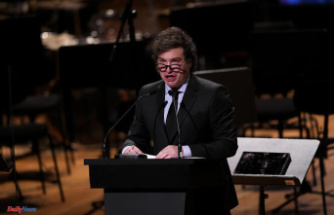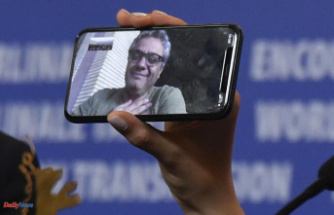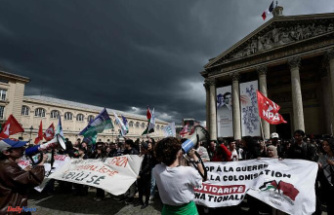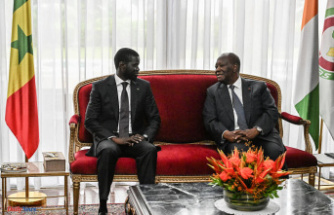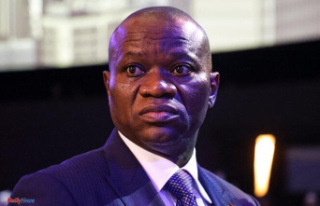Thursday January 4, shortly before midnight, the president of the criminal chamber of the Supreme Court of Senegal finished listing the results of the long deliberation with his seven fellow magistrates. Ousmane Sonko's ten lawyers leave the court in a silent procession. The court has just made final a conviction which compromises the eligibility of the opponent: six months suspended prison sentence for “defamation and insults” after accusations of mismanagement of an agricultural program against Mame Mbaye Niang, the Minister of Tourism and leisure.
Me Bamba Cissé, the spokesperson for the team of lawyers, disappears behind the wheel of his car just as Cheikh Khoureyssi Ba, another member of the collective, timidly approaches the press. His words are hesitant, but his reaction is a cold shower for his client's supporters: “Mr. Sonko's political adversaries have succeeded in their objective of eliminating him. » Faced with the torrent of criticism and accusations of “treachery” on social networks, Me Ba will publish an apologetic correction overnight. His reaction, however, will prove to be premonitory: on Saturday January 20, the Constitutional Council officially excluded the main opponent from the race in the presidential election on February 25.
Ousmane Sonko, who came third in the 2019 presidential election, nevertheless believed that his destiny was written in advance. “Please God, nothing and no one will be able to prevent me from being a candidate in 2024,” proclaimed in April 2021 the leader of the Patriots of Senegal for work, ethics and fraternity (Pastef, today dissolved). Two months earlier, he was the target of a complaint for “rape and death threats” filed by Adji Sarr, the start of a series of legal pitfalls.
The case, which now bears the name of the Dakar massage parlor Sweet Beauty – which he admits to having frequented for “chronic back pain” – is the most serious of his troubles with the Senegalese justice system. “It was negligence on his part,” judges a member of the opposition, seeing there “a trap” set by his rivals. President Macky Sall “does not know the law, but rather the balance of power”, insists Ousmane Sonko, who cries “conspiracy” and calls for “resistance”.
The street in turmoil
The violent clashes of March 2021, on the sidelines of his first summons to the gendarmerie, turned in his favor. The State was forced to reverse course and released him five days after his arrest to calm down a Senegalese street in turmoil. Fourteen deaths in five days: this is the start of a cycle of repression of demonstrations which will cause more than 40 victims in two years and one of the worst political crises experienced by Senegal since its independence. “What happened will not happen again,” Macky Sall had threatened a few weeks after the unrest. “Was there violence after the Supreme Court verdict? No, the State has taken its responsibilities,” now rejoices an advisor to the president.
The head of state almost never publicly mentions the name of his opponent. Nevertheless, when on July 3, in his speech renouncing a third candidacy, half of his speech was devoted to the "gravediggers of the nation, of the State, of the Republic", with whom he promised not to compromise, the numerous allusions to Ousmane Sonko's camp do not escape observers of a political scene polarized between these two men.
On July 28, the rest of this speech will take the entire country by surprise. Arrested for a charge of stealing a plainclothes gendarme's phone in front of his home, the opponent is charged with nine other counts, including "calling for insurrection", over the period from March 2021 to June 2023, date of his conviction in absentia to two years in prison for “corruption of youth” in the trial between him and Adji Sarr.
In the hours following the arrest of their leader and then the dissolution of their party, on July 31, for “frequent calls for insurrectional movements”, the Pastef executives unsuccessfully multiplied the appeals to a breathless street.
Playing the kingmaker
Resignation or change of strategy, Pastef is now calling on its supporters to avoid any manifestation of temper, to focus on the February presidential election. Ousmane Sonko, 49, regained his strength after having been worn out, according to the statements of those around him which remain unverifiable, by two hunger strikes, from the end of July to September and then in October, to demand his release. He receives his personal doctor every forty-eight hours and finalizes a work program for the campaign, according to his visitors at Cap Manuel prison, in Dakar.
Did he feel his presidential future was in danger? Against the advice of his party executives, the Pastef leader had summoned his entourage in recent years to work on an alternative candidacy. Today, he is the one in charge from his cell. “Continuing to say “Ousmane Sonko or nothing” would have propelled us into a bubble with no possibility of exit,” admits Ababacar Sadikh Top.
In the final stage of his duel with power, Mr. Sonko advances his pawns with the candidacies of Bassirou Diomaye Faye, his right-hand man and neighbor in detention, and Habib Sy, a former member of the Senegalese Democratic Party (PDS) who has become his ally in the main opposition coalition, Yewwi Askan Wi. As for Cheikh Tidiane Dièye, Ousmane Sonko's former spokesperson for the 2019 presidential election, he represents an unofficial option for the dissolved party. These three candidacies were validated by the Constitutional Council.
However, with its dissolution, its headquarters closed, its demands for demonstrations systematically prohibited and several of its executives in exile, will Sonko's political party be able to recover? “Apart from this impossibility of producing an official document with Pastef mention and stamp, the dissolution had no impact on the progress of our party,” assures Ousseynou Ly, a member of Mr. Sonko’s cabinet.
“Victory is achieved.”
The former inspector of taxes and domains, propelled to the forefront by his dismissal in 2016 from the civil service after accusations of tax advantages granted to parliamentarians, built his “anti-system” image on the rejection of “apparent political class.” He virulently criticizes Senegal's "dependence" on France and promises "sovereignty", including monetary ones with the exit of the CFA franc.
Often accused of “populism” by his detractors, his speech particularly appeals to young people, who see it as an alternative to a political landscape that has seen little renewal. A good speaker, Ousmane Sonko complains of being censored by those around him but sometimes lets himself be carried away by his verve.
For its part, the ex-Pastef is mobilizing its representatives within the Senegalese diaspora, particularly in France, where it claims nearly 10,000 members and has developed links with members of La France insoumise (LFI) since 2021. “When his opponents began to demonize him as a Salafist, we took our pilgrim's staff to present our vision and explain that we were not against France or any other Western country, but that we wanted a winning system -winner,” explains Aliou Sall, coordinator of the ex-Pastef in France and deputy for the diaspora.
The latter is essential to the party for its financial mobilization. On January 14, ex-Pastef officials on tour abroad announced that they had already raised nearly 500 million CFA francs (around 760,000 euros) to finance their campaign. Sonko's camp is actively preparing for the presidential election, but is keeping a mystery about the configuration of power in the event of victory for their candidate – not yet nominated but who should be, barring any surprises, Bassirou Diomaye Faye. “We created and carried out a project. Regardless of the patriot who wears it, victory in the first round is already achieved,” says El Malick Ndiaye, Pastef’s national communications secretary, with confidence.


